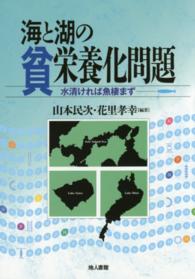- ホーム
- > 洋書
- > 英文書
- > Politics / International Relations
Full Description
This book challenges the notion that strategic narratives, which carry soft power significance, are seamlessly projected to audiences. It offers the first book-length critical analysis of the non-linear dissemination of strategic narratives in the digital age, focusing on social media.
Through a case study of a Chinese state-aligned outlet's mediation of Russian broadcaster RT's videos and their remediation by Chinese social media users' danmu comments on Bilibili, it reveals disruptions by participatory media agents, including outlets and audiences. These multilayered mediations, driven by political and commercial agendas or online practices, yield unexpected benefits and challenges for narrative producers. The book's main argument is that state actors have little control over the dissemination of the strategic narratives they project in the digital age. The dissemination paths of these narratives are non-linear and involve multilayered mediations imposed by other political actors for their own political and commercial agendas, as well as mediations introduced by participatory audiences who impose their own online practices, conventions, and rituals onto the narratives.
A major intervention in the study of soft power projection through public diplomacy in the online era and the emerging geopolitical alliance between Russia and China, this interdisciplinary book will be of interest to researchers in the fields of Media Studies, Russia-China relations, Political Communication, Digital Culture, and Studies of Russian politics and Chinese politics.
Contents
Introduction 1. Repurposing RT Videos from YouTube for Bilibili 2. Linguistic Mediation of The Observer's RT-Sourced News 3. Audio-Visual Mediation of The Observer's RT-Sourced News 4. Danmu Comments as the Bilibili Community's Response to Russian Strategic Narratives 5. Danmu Commenters' Reception of Putin 6. Danmu Commenters' Reception of Russia and Its Place in the World Conclusion








